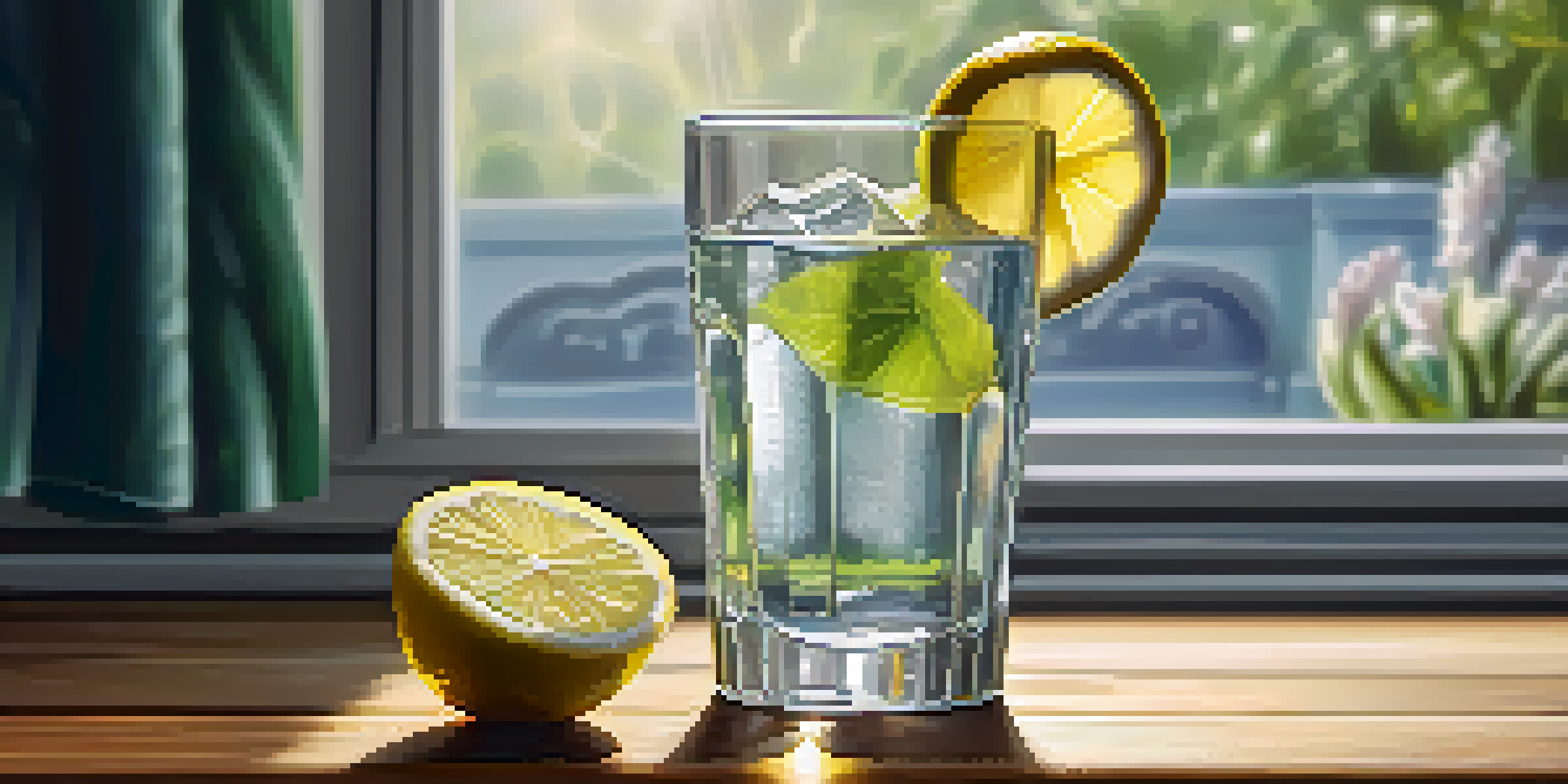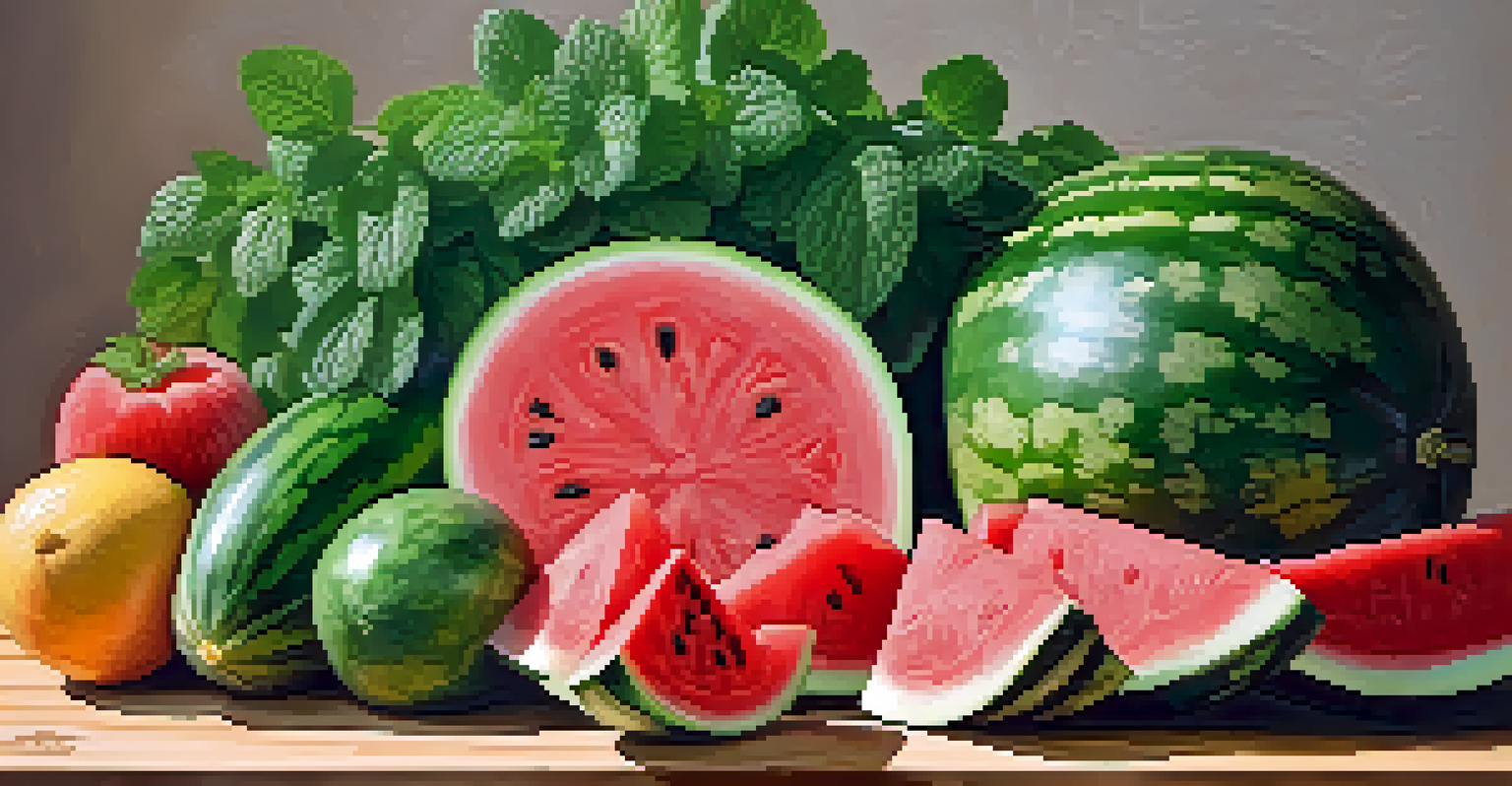Hydration: Understanding Water's Role in Nutrition

Why Hydration is Crucial for Your Body
Hydration is fundamental to maintaining bodily functions and overall health. Water makes up about 60% of your body weight and is vital for processes like digestion, circulation, and temperature regulation. When you're adequately hydrated, your organs function optimally, and you feel more energetic.
Water is the driving force of all nature.
Conversely, dehydration can lead to a host of issues, from headaches and fatigue to more severe complications like kidney stones. It's essential to recognize that even mild dehydration can impair cognitive function and mood. So, drinking enough water is not just a physical necessity; it's crucial for mental clarity, too.
Incorporating hydration into your daily routine can be as simple as carrying a water bottle or setting reminders to drink water. By prioritizing hydration, you support your body in performing its best and enhance your overall quality of life.
The Science Behind Hydration Needs
Understanding hydration needs can be a bit complex, but it essentially boils down to factors like age, weight, activity level, and climate. Generally, a common recommendation is to drink eight 8-ounce glasses of water a day, often referred to as the '8x8 rule.' However, individual needs can vary significantly.

For instance, athletes or individuals living in hot climates may require more water to compensate for fluid loss through sweat. On the other hand, older adults might have decreased thirst sensations, which can lead to insufficient intake. Recognizing these variations can help tailor your hydration strategy effectively.
Hydration is Essential for Health
Staying adequately hydrated supports bodily functions, enhances energy levels, and promotes mental clarity.
Moreover, it's not just about drinking water; hydration can also come from foods. Fruits and vegetables, such as watermelon and cucumbers, contain high water content and can significantly contribute to overall fluid intake. Balancing both liquid sources and solid food can help you meet your hydration needs.
Signs of Dehydration to Watch For
Being aware of the signs of dehydration is crucial for maintaining your health. Common symptoms include dry mouth, fatigue, dizziness, and dark yellow urine. If you notice any of these signs, it’s a clear signal that your body needs more fluids.
Pure water is the world's first and foremost medicine.
In some cases, dehydration can escalate into more serious issues, such as heat-related illnesses or kidney problems. It's especially important for vulnerable populations, like children and the elderly, to stay hydrated, as they may not recognize these symptoms as quickly.
To prevent dehydration, it's essential to make hydration a priority throughout the day. Simple habits like drinking a glass of water before meals or keeping a water bottle within reach can go a long way in ensuring you stay hydrated.
Hydration and Physical Performance
Hydration plays a significant role in physical performance, affecting everything from endurance to strength. When you're well-hydrated, your muscles work more efficiently, and you can push through workouts with greater ease. This is particularly important for athletes who rely on optimal hydration to maintain peak performance.
Conversely, even slight dehydration can lead to diminished performance. Studies have shown that losing just 2% of your body weight in water can negatively impact endurance and strength. This means that staying hydrated isn't just about feeling good; it's essential for achieving your fitness goals.
Recognize Dehydration Symptoms
Being aware of signs like dry mouth and fatigue can help you address dehydration before it leads to serious health issues.
To maximize your performance, pay attention to your fluid intake before, during, and after exercise. Drinking water or electrolyte-rich beverages can help replenish what you lose through sweat and keep your energy levels high.
The Impact of Hydration on Mental Health
Hydration isn't only vital for physical health; it also significantly impacts mental well-being. Studies have shown that even mild dehydration can lead to symptoms like irritability, fatigue, and difficulty concentrating. When your brain lacks adequate hydration, it can affect your mood and cognitive function.
Additionally, staying hydrated can help reduce the risk of anxiety and depression. Water helps maintain the balance of neurotransmitters, the chemicals that transmit signals in the brain. By ensuring you're well-hydrated, you support your mental health as well as your physical health.
Incorporating hydration into your daily routine can be a simple yet effective way to boost your mood and mental clarity. Whether it's through drinking water or consuming hydrating foods, making hydration a priority can lead to a happier, healthier you.
Hydration Myths: Debunking Common Misconceptions
There are several myths surrounding hydration that can lead to confusion. One common misconception is that you only need to drink water when you're thirsty. While thirst is a good indicator, it’s not always reliable, especially for older adults whose thirst signals may be diminished.
Another myth is that all fluids are equally hydrating. While beverages like tea and coffee can contribute to your fluid intake, they often contain caffeine, which can have a diuretic effect. This means they might not be as effective for hydration as plain water or electrolyte drinks.
Hydration Boosts Physical Performance
Proper hydration significantly impacts endurance and strength, making it essential for achieving fitness goals.
Understanding the facts about hydration can help you make better choices. Remember, it’s essential to listen to your body and prioritize water as your primary source of hydration.
Tips for Staying Hydrated Throughout the Day
Staying hydrated doesn’t have to be a chore; there are plenty of fun and easy ways to incorporate more fluids into your day. Start by keeping a water bottle handy; having it visible can serve as a constant reminder to drink more often. Setting reminders on your phone can also help you establish a routine.
Another great tip is to infuse your water with fruits or herbs for added flavor. This can make drinking water more enjoyable, encouraging you to consume more. Think mint and lime or cucumber and lemon – the possibilities are endless!

Additionally, consider incorporating more hydrating foods into your meals. Salads, smoothies, and soups are excellent options that can help boost your water intake. By combining these strategies, you can effortlessly enhance your hydration and enjoy the benefits that come with it.